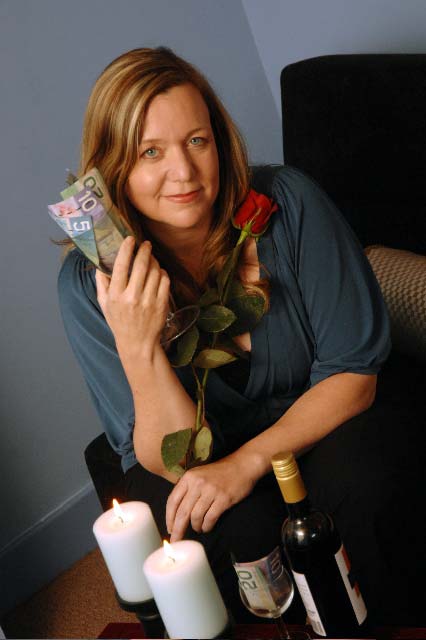 |
| Economics professor Marina Adshade devised the new course, The Economics of Sex and Love. (Danny Abriel Photo) |
Who enjoys sex more, men or women? The question is risky as well as risqué; Greek myth states that the goddess Hera blinded Tiresias for his answer when he surmised women took more pleasure from the act.
Marina Adshade’s response is cannier than Tiresias’: “About 75 per cent of the civilizations believe that women and men enjoy sex equally,” she says carefully. Dr. Adshade is an economic historian, and she’s about to teach Dalhousie’s first semester of Econ 2214: Economics of Sex and Love. Dr. Adshade designed and proposed the course herself.
I try to picture the reactions in the dean’s office.
“Oh, they loved it,” Dr. Adshade assures me. “I worked really hard to put together a very convincing course outline.”
And of course, I suggest, the subject matter didn’t hurt.
“Well, there’s (already) three courses at the university on sex.” Dr. Adshade checked the course outlines of those classes, so that her material wouldn’t overlap. ““It’s not that any of the topics aren’t being touched on… it’s the approach, really, that is different.”
The approach is a broad one—Economics of Sex and Love will cover millennia of human history, from the first marriages in Neolithic times to modern sexual issues. There is no course textbook, as little writing has been done on the subject matter; Dr. Adshade is in the process of assembling individual papers and studies into a course reader.
|
“Economists have some really good tools for looking at these issues. Sex markets, prostitution, pornography… these are essentially labor markets,” she explains. The class is not exclusively for students of economics; she encourages all interested students to sign up for the course. Maturity, rather than major, will define the audience. “I think the class is going to be a little bit racy to some people, quite frankly… my intention is to teach a course for adults.”
Racy? “Out of 186 societies, only 14 per cent have monogamy. The large majority of the world’s population lives in a polygamist society.” Dr. Adshade finds this fascinating; economic theory predicts richer men will have more wives, but the opposite trend has emerged in reality. While recent headlines have turned polygamy into a hot-button topic, Dr. Adshade isn’t interested in finding morality tales in her material. She’s strictly concerned with the facts. “The thing about economists… (is) we don’t make statements about how we feel people should behave. I like to give people the information, and then let people take away the information they want. I’m sticking to just the economics of it… I want it to be a fun class.”
The material is often surprising – for instance, studies suggest that men, rather than women, are under pressure to fake orgasm. Ms. Adshade also suggests the majority of prostitutes prefer to work under a pimp for protection. “Three per cent of tricks performed by prostitutes without pimps are freebies for police or gang members,” Ms. Adshade tells me, forehead furrowed. She then pauses, reaching for her keyboard to check the statistic. While she does this, I glance at the lines of Alexander Pope’s poetry Dr. Adshade has scrawled on her whiteboard: “What Nature wants (a phrase I much distrust)/Extends to luxury, extends to lust…” She sits back from her computer a second later, satisfied. The number was right.
“The choices that we make about our own sexuality and the relationships we form have some basis in economics,” she explains. “We often think that we’re making choices… but it’s all biology and economics.”
The class will include studies on marriage, speed dating, online dating sites, risky sexual behaviors, AIDS, and controversial subjects such as teen sexuality and prostitution. Ms. Adshade will even ask the other ageless question—Does sex make you happy?
Well, I ask, does sex make you happy?
Ms. Adshade laughs. “Sex does make you happy! Sex makes women happier than almost anything else.” Tiresias has been validated, and it only took a few thousand years.
